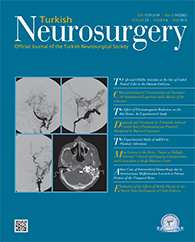2Ankara Numune Education and Research Hospital, Department of Neurosurgery, Ankara, Turkey
3Gazi University, Faculty of Medicine, Department of Histology and Embryology, Ankara, Turkey DOI : 10.5137/1019-5149.JTN.8051-13.0 AIM: In the present study, we investigate the neuroprotective effects of rituximab, a monoclonal antibody directed towards B cell mediated humoral immunity, on a rat spinal cord injury (SCI) model with immunohistochemical methods.
MATERIAL and METHODS: Twenty-four rats were used for the study. Rats were divided as control, SCI, and rituximab-treated SCI groups. Intraperitoneal rituximab administration was performed on days 0, 3 and 5 in the third group. Rats were sacrificed 7 days after trauma. Antibodies against IL-1β, IL-6, TNF-α and CD20 were studied with the ELISA method together with electron microscopic analysis.
RESULTS: It was found that rituximab suppressed oligodendrocytes at the phagocytic stage but was still inefficient for the regenerative phase. TNF-α expression was markedly increased in rats subjected to SCI and suppressed after rituximab treatment. Decreased CD20 expression was another prominent finding in rats under rituximab therapy. However, expressions of IL-1β and IL-6 were both increased in glial cells without significant change after rituximab administration.
CONCLUSION: TNF-α expression was augmented at the level of SCI both in neuronal and glial cells, particularly in oligodendrocytes. All were suppressed after rituximab administration and rituximab reduced CD20 expression both in neuronal and supportive glial cells which may be related to neural healing.
Keywords : B-lymphocyte, CD20, IL1β, Rats, Rituximab, Spinal cord injury, TNF-α




